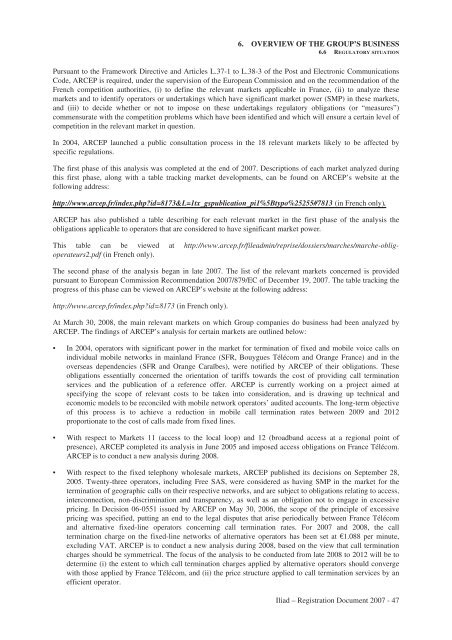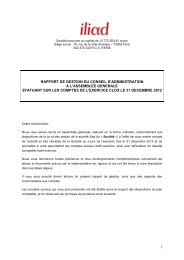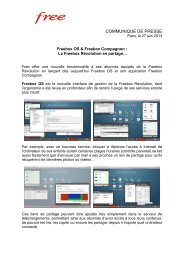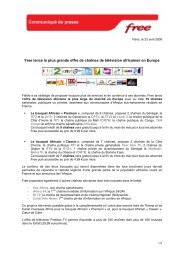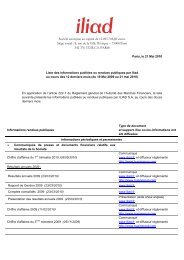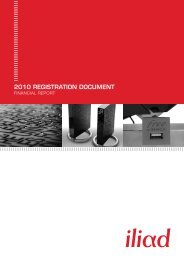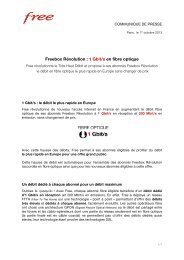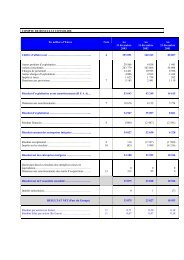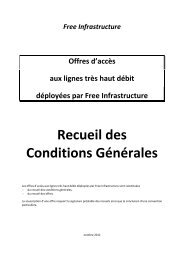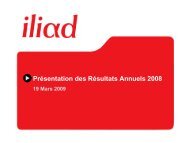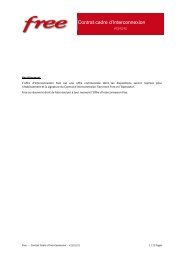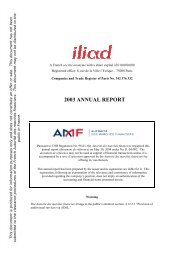REGISTRATION DOCUMENT AND FINANCIAL REPORT - Iliad
REGISTRATION DOCUMENT AND FINANCIAL REPORT - Iliad
REGISTRATION DOCUMENT AND FINANCIAL REPORT - Iliad
- TAGS
- registration
- iliad
- iliad.fr
You also want an ePaper? Increase the reach of your titles
YUMPU automatically turns print PDFs into web optimized ePapers that Google loves.
6. OVERVIEW OF THE GROUP’S BUSINESS<br />
6.6 REGULATORY SITUATION<br />
Pursuant to the Framework Directive and Articles L.37-1 to L.38-3 of the Post and Electronic Communications<br />
Code, ARCEP is required, under the supervision of the European Commission and on the recommendation of the<br />
French competition authorities, (i) to define the relevant markets applicable in France, (ii) to analyze these<br />
markets and to identify operators or undertakings which have significant market power (SMP) in these markets,<br />
and (iii) to decide whether or not to impose on these undertakings regulatory obligations (or “measures”)<br />
commensurate with the competition problems which have been identified and which will ensure a certain level of<br />
competition in the relevant market in question.<br />
In 2004, ARCEP launched a public consultation process in the 18 relevant markets likely to be affected by<br />
specific regulations.<br />
The first phase of this analysis was completed at the end of 2007. Descriptions of each market analyzed during<br />
this first phase, along with a table tracking market developments, can be found on ARCEP’s website at the<br />
following address:<br />
http://www.arcep.fr/index.php?id=8173&L=1tx_gspublication_pi1%5Btypo%25255#7813 (in French only).<br />
ARCEP has also published a table describing for each relevant market in the first phase of the analysis the<br />
obligations applicable to operators that are considered to have significant market power.<br />
This table can be viewed at http://www.arcep.fr/fileadmin/reprise/dossiers/marches/marche-obligoperateurs2.pdf<br />
(in French only).<br />
The second phase of the analysis began in late 2007. The list of the relevant markets concerned is provided<br />
pursuant to European Commission Recommendation 2007/879/EC of December 19, 2007. The table tracking the<br />
progress of this phase can be viewed on ARCEP’s website at the following address:<br />
http://www.arcep.fr/index.php?id=8173 (in French only).<br />
At March 30, 2008, the main relevant markets on which Group companies do business had been analyzed by<br />
ARCEP. The findings of ARCEP’s analysis for certain markets are outlined below:<br />
• In 2004, operators with significant power in the market for termination of fixed and mobile voice calls on<br />
individual mobile networks in mainland France (SFR, Bouygues Télécom and Orange France) and in the<br />
overseas dependencies (SFR and Orange Caraïbes), were notified by ARCEP of their obligations. These<br />
obligations essentially concerned the orientation of tariffs towards the cost of providing call termination<br />
services and the publication of a reference offer. ARCEP is currently working on a project aimed at<br />
specifying the scope of relevant costs to be taken into consideration, and is drawing up technical and<br />
economic models to be reconciled with mobile network operators’ audited accounts. The long-term objective<br />
of this process is to achieve a reduction in mobile call termination rates between 2009 and 2012<br />
proportionate to the cost of calls made from fixed lines.<br />
• With respect to Markets 11 (access to the local loop) and 12 (broadband access at a regional point of<br />
presence), ARCEP completed its analysis in June 2005 and imposed access obligations on France Télécom.<br />
ARCEP is to conduct a new analysis during 2008.<br />
• With respect to the fixed telephony wholesale markets, ARCEP published its decisions on September 28,<br />
2005. Twenty-three operators, including Free SAS, were considered as having SMP in the market for the<br />
termination of geographic calls on their respective networks, and are subject to obligations relating to access,<br />
interconnection, non-discrimination and transparency, as well as an obligation not to engage in excessive<br />
pricing. In Decision 06-0551 issued by ARCEP on May 30, 2006, the scope of the principle of excessive<br />
pricing was specified, putting an end to the legal disputes that arise periodically between France Télécom<br />
and alternative fixed-line operators concerning call termination rates. For 2007 and 2008, the call<br />
termination charge on the fixed-line networks of alternative operators has been set at €1.088 per minute,<br />
excluding VAT. ARCEP is to conduct a new analysis during 2008, based on the view that call termination<br />
charges should be symmetrical. The focus of the analysis to be conducted from late 2008 to 2012 will be to<br />
determine (i) the extent to which call termination charges applied by alternative operators should converge<br />
with those applied by France Télécom, and (ii) the price structure applied to call termination services by an<br />
efficient operator.<br />
<strong>Iliad</strong> – Registration Document 2007 - 47


